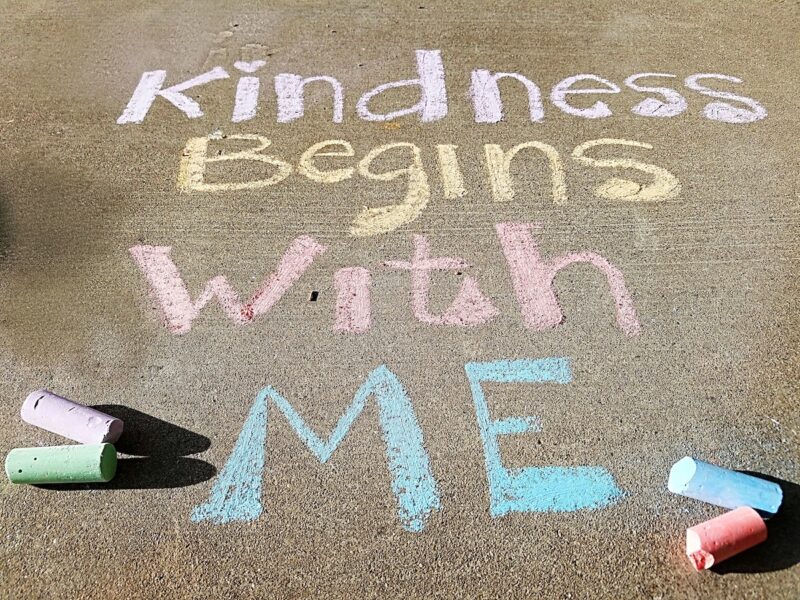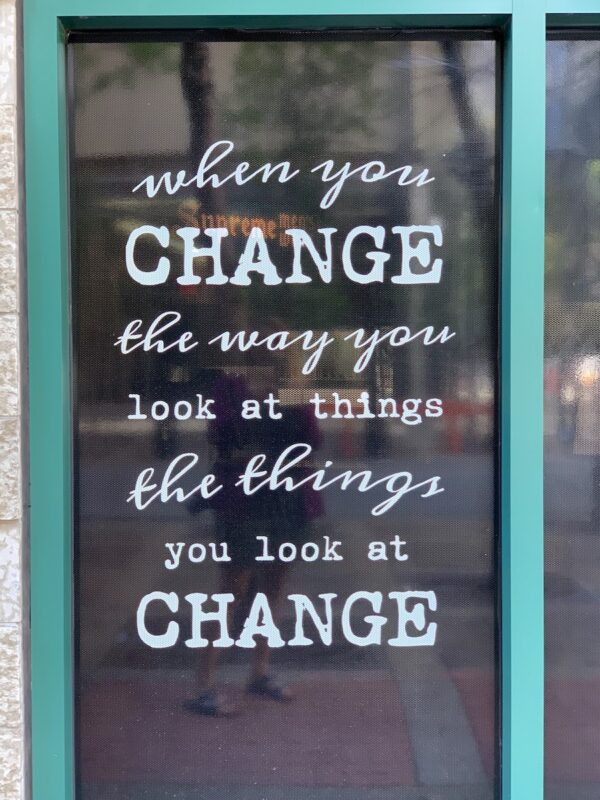I love my journal, but sometimes it can become a negative mindtrap. I look down and see all my stresses, worries, and fears. While it’s good to air it out, there needs to be a healthy balance. That’s where positive thinking exercises comes in.

While your journal is a great place to share and work through your woes, it can also be a place to tell your brain a success story. You know… all those wins and small celebrations we so often miss.
I’m talking about sharing positive thoughts and getting in the habit of positive thinking in your journal.
I find it’s critical to have that in my life to keep me motivated and see the good in the world. There’s a lot going on right now, and I’d like to think I can make a difference, no matter how small.

If you struggle with staying positive or finding all the positive things in the world and in life, and are open to trying some positive thinking exercises in your journal, then this is the post for you.
Below, I’ve got some great tips and positive thinking techniques you can use in your daily journal.
6 Positive Thinking Techniques to Try in Your Journal
Positive Thoughts and Positive Affirmations (They Really Work!)

A lot of people push back against the idea of using positive affirmations to adopt a more positive outlook on life.
To those people, Positive affirmations either:
- Feel daunting to some people who have no idea where to start.
OR
- Seem like a far-fetched idea that doesn’t work.
However, you don’t have to believe in the greater universe to try out positive affirmations or use manifestation.
We all have narratives in our heads, which basically means the way we talk to ourselves.
A few years ago, I was an extremely critical thinker with a ton of negative thoughts and negative emotions. I put myself down a lot. I harshly judged every action. Things I didn’t do, things I did, it was impossible to win! And I’d been feeding myself that diet of negative thoughts and narrative for a long time.
Positive affirmations help you to tell you a different story, which leads to a more positive outlook. Simple, right?
If you’ve grown up in a household that doesn’t value your worth or think you will get very far, then positive affirmations are a chance for you to craft a positive and successful storyline about yourself and your life.
Instead of feeding yourself a constant diet of negative feelings – ‘I am not worthy, I am ugly, I will never be successful’ – you can practice positive thinking by feeding yourself healthy words and positive words – ‘I am brave. I am following my dreams. I am capable of achieving everything I set out to do.’

Choose a positive affirmation (I would advise a maximum of three), then consistently write it down in your journal. You can do it in the morning or the evening, write it out once or ten times. It’s up to you!
You can also post them in places you’ll see them, like on your bathroom mirror, on the wall of your office, as your phone lock screen, etc.
The only rule is to practice writing, speaking, and reading the positive words and affirmation daily.
Try Gratitude Journaling (Here’s Why…)
I know, I know…gratitude again. But for good reason.
Writing a gratitude list is scientifically proven to rewire negative thinking, develop awareness, and provide an instant boost of serotonin (your happy hormone).
It’s a type of affirmation because you’re writing a positive statement. For instance, ‘I am grateful I am writing this article because I am helping other people, which feels good.’
You can make a daily gratitude list (three is always a good number), or you can simply appreciate gratitude at the moment. There may be a time when you look around and have a sudden whoosh of thankfulness, gratitude and positive thinking. Acknowledge that moment and let gratitude expand like a bubble inside.
I find the more I journal about gratitude, the more I appreciate snapshots of life in real-time. It’s a great way to transform negative thoughts and a negative mindset into ones of optimism and positive feelings.
A Daily Self-Care List (Not a Checklist!)
This is one of my all-time favorite positive thinking exercises when I need a mental health boost, because it doesn’t have the pressure of ticking off a darn checklist.
When I’m really struggling with mental health, having a list of things I should do, like drinking water, going for a walk, eating healthily, etc., isn’t a great idea. It makes me feel guilty when I don’t have the energy to achieve those things.
Instead, write down the self-care activities you have done. It doesn’t have to be going to yoga or eating broccoli. They can be basic things like brushing your teeth, watching your favorite TV program, or opening the windows.
When you see the collection of your caring actions each evening, it feels so good. It helps you focus on your positive thoughts about your day, and seeing the silver lining in a tough day and can make you want to continue the practice in your everyday life.
Overcome Negative Thinking by Reframing it in Positive Ways
I don’t know about you, but I have a really bad habit of complaining. I complain about money, my weight, my looks, and my current situation.
I’m a pretty optimistic and bubbly person, but these little negative voices and negative thoughts always lurk in the back of my mind and come out to play during stressful times.
But I’ve found a way to help myself in these situations. I switch up negative language with positive statements and alternatives.

Positive Thinking for Money
One of my big habits is telling myself the story, ‘I’m broke, I don’t have enough money, or I need more cash.’
I’ve tried saying things like, ‘My income increases constantly,’ ‘I am earning all that I need,’ etc.. You know, changing my money mindset.
The thing is, my brain doesn’t really believe me.
When I tell myself I’m earning more than I need, it doesn’t help when a friend asks, ‘Hey, do you want to go for drinks?’ The voice inside my head says, ‘You don’t have enough money to do that.’ I need a way to tell people I’m short on cash without using a ‘lacking’ mindset.
When you find yourself thinking:
I’m broke/I don’t have enough money/ I can’t afford it.
Try switching your thinking away from negative things and shift the narrative in a more positive direction:
I am being intentional with my spending/I am being mindful of my budget.
Positive Thinking for Fear
Be careful, and make sure you don’t hurt yourself!
This language is based on fear and anxiety. It can make you hesitate or not want to do something, including calculated risks that will help you achieve your dreams.
Instead, use language such as:
I am being mindful of my actions.
It’s different because, just like the money scenario, you are aware and intentional with your choices.
Positive Thinking for Achievements
I didn’t achieve what I wanted to do today.
The words ‘didn’t’ and ‘achieve’ really focus on your outcomes rather than the process. You feel bad because everything didn’t go to plan, but that’s life, isn’t it?
Studies show that when kids receive praise for their effort in learning new skills rather than their achievements, they do far better. That’s because they’re not afraid to fail. The focus isn’t on whether they are successful or not, but on how hard they tried.
You can do the same.
Change what you didn’t get done for this:
I turned up, and I gave it a go/ I tried my best, and that’s what’s important / I made progress, and for that, I’m thankful.
Positive Thinking for Feelings
A lot of people will advise telling yourself, ‘I am happy!’ but that’s a big mistake and one we’re not going to make here. When you ignore difficult feelings like anger, sadness, or guilt, it invalidates you as a person.
You are subconsciously telling yourself that you shouldn’t have those feelings and they don’t matter. Instead, you should ‘just be happy.’ However, thinking, ‘I am angry,’ or ‘I am depressed,’ is also a bit of a trap. That’s because you are labeling yourself as something that sounds permanent.
Instead of saying:
I am angry/I am upset/I am depressed
Switch it to:
I am experiencing anger / I am experiencing sadness / I feel frustrated right now
When you experience something, you are acknowledging a moving emotion, and that the feeling will pass. Feelings are made equal, so just like happy moments will pass, so will sad ones.
Will it Matter in…(The Six-by-Six Exercise)
There was a time in my life when my physical health was really bad, I felt isolated, and my positive mindset took a nosedive. Shortly after that, I had a mental break and quit my job without notice. It was one of those times when I just ‘snapped.’
In full panic, I desperately tried applying for jobs, but it was hard going. My self-esteem was shot to pieces, and I didn’t believe I was qualified for any of the positions (I definitely was). Trying not to freak out about my dwindling finances, I Googled ‘Ways to change your mindset,’ and I came across the six-by-six rule.
Whenever you’re struggling, ask yourself this:
Will it matter in six hours?
Will it matter in six days?
Will it matter in six weeks?
Will it matter in six months?
Will it matter in six years?
When it came to my situation, I answered ‘yes’ to nearly all of the questions, but when I got to six months, I stopped.
‘Will it matter in six years?’ I thought. No, it would not. Of course, I would get a job in six years’ time. I will earn money, and I’ll recover what I’m going through. This situation I’m in, no matter how difficult it is, will be okay in six years’ time.
I still use this exercise now, and it instantly produces a feeling of calm and helps me overcome any negative attitude I have about my situation. Suddenly, everything seems more manageable. Because what you’re telling yourself is that in the long term, everything will be alright. And what are six years in the grand scheme of your life? Not a lot!
Man, the amount of wins, losses, highs, and lows I’ve had in the past six years is unbelievable. I think when you can see a better future for yourself (no matter how far away), it really stimulates positive thinking.
Create a Compliments Pile (Because You’re Worth It)
I once listened to a podcast (don’t ask me which one, I can’t remember), and a guest speaker said their bathroom tiles were made up of compliments. Each tile was personalized with praise people gave her over the years. Every time she went to the bathroom, she was surrounded by positivity.
The guest told the interviewer, ‘It sounds like I’m really full of myself, but I promise you it helps!’ I don’t think she’s full of herself at all. I think it’s an incredible idea.
No matter how successful you are, everyone has the fear factor. Everyone has doubts, and everyone becomes unsure of what they’re doing. It’s human nature.
And in those moments? Someone telling you that you’re talented, a good person, or how you’ve helped them makes all the difference.
Okay, so you may not have the spare cash to personalize your bathroom tiles, but you can create a compliments pile in your journal.
Keep it simple and record them every time someone says something positive, or get creative with it. Whatever you want.
Have a journal solely for compliments – a blank notebook getting filled up with compliments sounds pretty great to me! Or use a simple sheet of paper that you keep somewhere safe.
You could also collate them in a Google doc until the right time comes along to transform them into a mini ‘you’re awesome’ book.
Whenever you are doubtful or think negatively about yourself, you can pull it out and automatically refuel your self-belief and find more positivity.
Positive Exercises in Your Journal Have the Power to Transform Your Life
It’s no joke. Positivity exercises impact you in so many ways. They increase your confidence, self-esteem, belief, and the way you interact with others. There are so many ways you can rewire your negative thinking and guide it toward positivity. Grab your journal and start today.
You can do it. I believe in you. You have nothing to lose but your overall well being. I hope you enjoy these simple exercises for your journal!
If You Enjoyed This Article, You May Also Like:
7 Practical Steps To Start A Manifestation Journal
131 Gratitude Journal Prompts To Use In Your Journaling Practice
How To Create A Billionaire Morning Routine Using Your Journal




